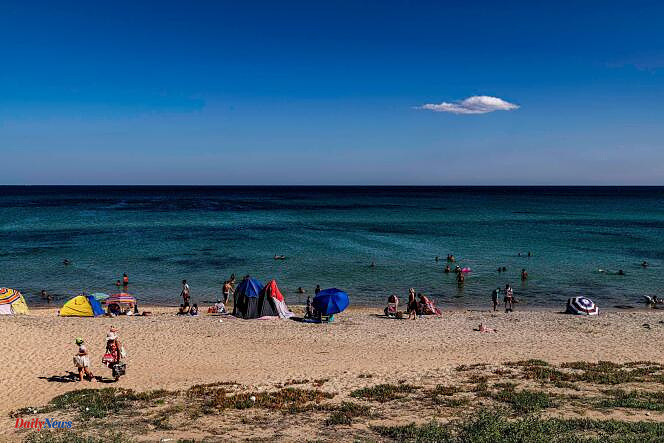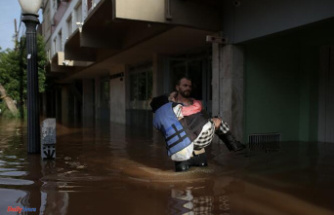The thermometer shows 44°C in Hammamet, a seaside resort located about sixty kilometers south of Tunis, on this Sunday, July 23, 2023. The air is scalding. The clear waters of the Gulf no longer allow you to cool off. The beach is almost empty of vacationers. Many coming from abroad and from the rest of the country to enjoy the sea and the cultural attractions of the region, most of them remained cloistered in their hotels, sheltered from the high temperatures which have been affecting the country for several days .
The frequency of heatwave events has increased significantly over the last decade throughout Tunisia due to global warming. They weigh heavily on the Tunisian tourism sector, which generates more than 14% of the country's gross domestic product according to a study by the firm KPMG published in 2019. "The effects, we see them first and foremost on electricity bills", made of greater use of air conditioning, explains Ramzi Akrout, director of the Sindbad hotel, on the edge of the Gulf of Hammamet. “When we hold operational meetings, we realize that consumption peaks correspond to heat peaks,” he emphasizes.
Another point of tension: water. Showers, toilet flushes, swimming pools, cleaning, kitchens... “Hotels consume a lot of it,” recognizes Mr. Akrout, while Tunisia is experiencing a reduction in its water resources. Affected by the Covid-19 pandemic, the tourism sector has for the moment escaped the rationing introduced by the authorities in spring 2023 to limit consumption. “It creates discontent among the population,” which is faced with daily cuts and is very critical of this exceptional regime, concedes Mr. Akrout.
In Hammamet, professionals in the sector watch helplessly as the coastline is eroded. The beach has lost nearly three hectares of its surface area over the past thirty years. A reduction caused by the combined effects of "sea rise", the increase in storms and the construction of obstacles to the circulation of sand such as "dams on rivers which prevent the transport of sand towards the sea » and ports, explains the director of the Coastal Protection and Development Agency (APAL), Mehdi Belhaj.
“If this continues, customers will go to other destinations”
It now happens that the waves come directly against the coastal buildings, engulfing the entire beach. “If this continues, customers will go to other destinations,” warns Ramzi Akrout. “All competing destinations are experiencing the same problems linked to climate change,” says Narjess Bouasker, director of the Menara hotel in Hammamet and president of the Regional Hotel Federation. The difference with Europe is the involvement of the government in tackling this problem. Unfortunately in Tunisia, we do not feel that this is a priority. »
In a report published in November 2023, the World Bank recommends that Tunisia, to protect itself from the economic consequences of climate change, diversify its tourist activities, currently mainly focused on seaside resorts – 90% of available beds are located near the sea –, develop environmentally friendly tourism and take urgent measures to protect the coastline.
Organization of conferences, sending of emails, demonstration in front of the municipality... Ms. Bouasker tried, with other local actors, to alert the public authorities about the state of the Hammamet beach but the solutions proposed are, according to her, inadequate and insufficient. “Last year, municipal services came to add sand to certain places on the beach, but two weeks later there was nothing left,” sighs the president of the Regional Hotel Federation.
“The solutions are expensive,” defends Mehdi Belhaj, director of APAL. Refilling one kilometer of beach with sand costs nearly 3 million dinars (nearly 900,000 euros) and the phenomenon is far from being confined to the Gulf of Hammamet alone: 340 of Tunisia's 600 kilometers of sandy beach are subject to strong erosion. So far, only 8% of these beaches have been protected.
The tourism sector forced to adapt
For their part, more and more hotel establishments are implementing solutions on their scale. In Sindbad, “we have installed economizers wherever there is a tap. We filter the water in the swimming pools which avoids having to empty and refill them from one year to the next. We collect rainwater,” says Mr. Akrout, specifying that his hotel raises awareness among its staff of these issues.
In Menara, the water is now heated by solar means. Ms. Bouasker was able to set up this system with the support of the National Energy Management Agency. “Unfortunately, not all establishments have the means to make these investments, especially since many are barely recovering from Covid and they do not have easy access to credit,” regrets the hotelier. In 2023, tourist numbers in Tunisia for the first time exceeded levels prior to the Covid-19 pandemic, but to maintain such vitality, the sector is obliged to continue to adapt.












